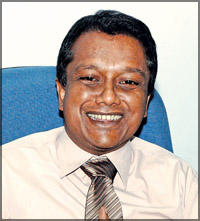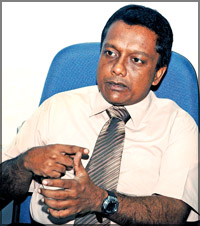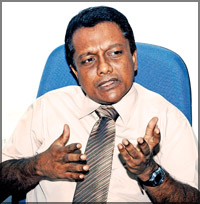|
Business Rendezvous:
Racial integration, a must for lasting peace
Shirajiv Sirimane
The minorities should be provided with better racial integration even
at this late stage to bring about a lasting settlement to the ethnic
conflict. The Sinhala Only Bill paved the way for discrimination of
Tamils and even today this problem is still evident to some extent,
Managing Director St. Anthony's Group, Jeyaseelan Gnanam said.
 One
of the key leaders in this diversified Group of Companies, Gnanam says
that when the Tamil community feels that there is no discrimination the
conflict will cease. He also says that the authorities should give more
emphasis on agriculture since it could bring about economic prosperity
to the country. One
of the key leaders in this diversified Group of Companies, Gnanam says
that when the Tamil community feels that there is no discrimination the
conflict will cease. He also says that the authorities should give more
emphasis on agriculture since it could bring about economic prosperity
to the country.
"However the Government should step in to minimise post harvest loss
and introduce new technology to increase yields," he said.
After successfully completing his higher education in United States,
Jeyaseelan joined his father, A. Y. S. Gnanam as an executive director
in the Group.
He plays a key role in moving the company to even greater heights.
His father is today ranked among the 50 greatest Sri Lankans after
Independence and his success is the most famous 'rags to - riches' story
having started his business life selling scrap-iron.
With a career that ran parallel to that of Independent Sri Lanka,
Gnanam prospered from his humble beginnings, to dent Sri Lanka the
multi-billion rupee St. Anthony's Group.
Q: How did your father start his
company?
Hailing from India he had neither affluent family background nor
powerful school tie ups to boast about, but he seized opportunities at
the correct time and created economic wealth. His first venture was when
he started buying and selling scrap iron.
There were also a lot of surplus construction equipment and materials
imported by the military, and as soon as the war stopped, all this
material was left over. As there was a severe shortage of scrap iron in
India at that time he was able to export big quantities to India.
Subsequently he started an import business by bringing in building
material from India as all the surplus material available via the
military had been exhausted. During the 1971 to 77 era when imports were
banned he used his knowledge to manufacture nuts, bolts and other
building material for the local market.
|

MD of St. Anthony’s Group Jeyaseelan Gnanam. Pictures by Saliya
Rupasinghe |
He also diversified to the apparel sector by starting to sell Syntex
which enjoyed a monopoly. I still remember people standing in queues to
buy the fabric.
Despite the restrictions, he managed to expand my business and moved
into hardware, plastics, radios (Sanyo) and radio spare parts and later
to the manufacture of S Lon PVC pipes which has scored many firsts in
the industry.
The company was badly affected during the '83 riots, as all his
businesses were attacked. However he remained in the country and re-
built his empire.
He was 'knighted' by many successive governments and these were
rewards for his successes.
Q: How is the group positioned today?
Today, the SA Group is involved in the manufacture of building
materials including PVC products, industrial fasteners, cement, fibre
cement corrugated roofing and flat ceiling sheets and light corrugated
roofing sheets. The Group has also diversified into the production of
textiles and in the recent decade the manufacture of apparel for the
domestic as well as for export.
The SA Group employs over six thousand personnel, has a turnover in
excess of Rs. 3,300 million (US$ 62 million) and fixed assets worth Rs.
1,500 million (US$ 28 million). The SA Group's manufacturing and trading
facilities occupy over 600,000 square feet and the properties they
occupy extend over 34 hectares which are valued at Rs. 1,150 million (US
$ 21 million).
Q: Looking back what would you think
was the most vital decision your father made?
I think it was his decision to get involved in the building materials
industry in 1960s. He saw that the demand never stops in this sector and
I think it was a step taken in the right direction. Today 61 per cent of
the group's turnover is from the building materials industry.
Q: How is the company looking at the
future?
 Looking
to the future, the SA Group is poised to enter the 21st century with
diversification into property development and high technology products
for export. Looking
to the future, the SA Group is poised to enter the 21st century with
diversification into property development and high technology products
for export.
The group intends to continue dominating the export industry
especially in heavy gauge knitwear and in the domestic market the
manufacture of building materials including roofing, cement and PVC
products with frequent modernisation and expansion utilising available
technology. It also intends to add several new products to its range of
building products within the coming decade.
Q: Do you think that some management
techniques used by your father are practical even today?
Yes. Most of them are. My father used to walk around the company and
got a first hand experience of his business. This is practical even
today and administrators can learn a lot by moving out of their air
conditioned rooms. He used to have Friday meetings with employees and
gain valuable insights from the employees for the businesses.
Q: How do you see the local public
transport system?
It is far behind as the country still banks on train and bus ignoring
the potential in the ferry system for both passenger and cargo.
This system was successfully practised in the colonial era and today
even in countries like Hong Kong and Europe. The local Dutch canals are
the best means of public transport.
Q: What are the trends in the roofing
industry?
Locally roofing tiles still hold 50 per cent of the market while 45
per cent use asbestos. The myth that asbestos are a health hazard is no
longer an issue. There are the major players in the local industry and I
am happy to announce that Rhino Roofing Products hold 42 per cent of the
market share.
However in countries such as Thailand, Singapore and Malaysia the
demand for roofing tiles are less and there is a tendency for steel
roofing products.
The company recently invested on a steel roofing project as there is
a new demand for this segment as well.
Q: Where would you like to spend your
holiday?
I love the south coast and if its overseas I like a country like
Singapore since it's a small country. |

